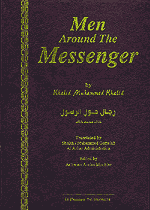Men Around The Prophet

(37)
`UTBAH IBN GHAZWAAN
Tomorrow You'll See the Nature of the Rulers after Me.
`UTBAH IBN GHAZWAAN
Tomorrow You'll See the Nature of the Rulers after Me.
Among the foremost Muslims and the first Muhaajiruun to Abyssinia and then Al-Madiinah, among the extraordinary fighters who proved themselves brave in the cause of Allah was this towering , brightfaced, and humble-hearted man, Utbah lbn Ghazwaan.
He was among the first seven who embraced Islam and extended their right hands to the right hand of the Messenger of Allah (PBUH). They pledged themselves to him while challenging the Quraish with all their fortitude and powerfor revenge. In the first days of the mission, the days of difficulty andterror, `Utbah Ibn Ghazwaan, together with his brothers, stood bravely,which turned out later to be the very provision that nourished the humanconscience and made it grow in the course of time.
When the Messenger of Allah (PBUH) ordered his Companions to emigrate to Abyssinia, `Utbah went with them, but his yearning for the Prophet (PBUH) did not allow him to settle there. Soon he hurried back to Makkah wherehe stayed near the Messenger until it was time for the Hijrah to Al- Madiinah. So, `Utbah emigrated again with the Muslims.
After the Quraish started their provocations and wars, `Utbah was always carrying his lance and bow, using them expertly and contributing with his believing brothers to the destruction of the old world, including all its idols and lies. He did not, however, put his weapons down after the noble Messenger had died, but kept fighting. His jihaad against the Persian armies was great.
The Commander of the Faithful `Umar Ibn Al-Khattaab sent him to conquerAl-Abullah and purify its land of the Persians who regarded it as a dangerouszone of action from which to launch out at the Muslim troops that would bemarching across the land of the Persian Empire, trying to save the countriesand slaves of Allah. While `Umar was bidding him and his army farewell, hesaid, "Proceed on your way until you reach the remotest Arab country andthe nearest foreign country. Go, and may Allah bless you.
Invite to Allah whoever answers you, and impose jizyaad upon whoever refuses or else use your sword without mercy. Wear the enemy down, and fear Allah your Lord."
Utbah advanced, heading an army that was not big until they reached Al-Abullah, where the Persians were massing one of their strongest armies. `Utbah organized his troops and stood at the front carrying his lance that never missed its target. He called out his soldiers, "Allahu akbar (Allah is the Greatest), and Allah will fulfill His Promise," as if he were reading something invisible. It was no more than blessed patrols before Al-Abullah surrendered. Its land was purified of the Persian soldiers, its people were liberated from the tyrannythat had often tormented them, and the Great Allah had fulfilled His promise.
In the same place as Al-Abullah, `Utbah planned the city of Al Basrah,constructed it, and built its great mosque. When he wanted to leave the cityand return to Al-Madiinah, escaping from the responsibilities of rule, theCommander of the Faithful ordered him to stay. `Utbah stayed in his placeleading people in prayer, instructing them in religion, judging between themwith justice, and giving them the most wonderful example in asceticism, piety,and simplicity. He fiercely fought the extravagance and luxury of those wholiked comforts and desires.
One day he made a speech addressing them. He said. "By Allah, I was the seventh of the first seven with the Messenger of Allah (PBUH), eating nothing but leaves of trees until the corners of our mouths were sore. I was given a garment. I cut it into two halves and gave one half to Sa'd lbn Maalik andI wore the other half."
`Utbah used to fear the extravagance of the world, and in order to protect his religion and the Muslims, he tried to persuade them to practice asceticism and moderation. Many people tried to turn him from his way, to arouse asense of ruling in his soul, and draw his attention to the right of ruling,especially in those countries that were never accustomed to such type ofascetic rulers and whose people used to respect high-ranking superciliousappearances. But `Utbah used to answer them saying: "I seek refuge in Allahfrom being great in your world and small in the sight of Allah." When hefound people bored with his austerity he induced them to be earnest andmodest saying, tomorrow you'll see the rulers after me."
When it was the Hajj season, he appointed one of his brothers as successor and went to make the Hajj.
When he finished, he traveled to Al-Madiinah and asked the Commander of the Faithful to discharge him from the rule. But `Umar would not lose the reverent ascetic who fled from what the mouths of mankind watered for. He used to say to them, "You burden me with your trusts and leave me alone?No, by Allah, I'll never discharge you." And that was what he said to `UtbahIbn Ghazwaan.
As `Utbah could do nothing but obey, he took his camel and rode it backto Al-Basrah. But before he mounted it he turned to the Qiblah and raisedhis imploring hands to heaven and invoked Almighty Allah not to return himto Al-Basrah or to government rule again. His invocation was answered, forwhile he was on his way to this rule, he died. His spirit was given up toits Creator. It was happy with what it had exerted and given, with its asceticismand continence, with the favor that Allah had completed upon it, and withthe reward that Allah had prepared for it.
